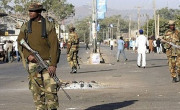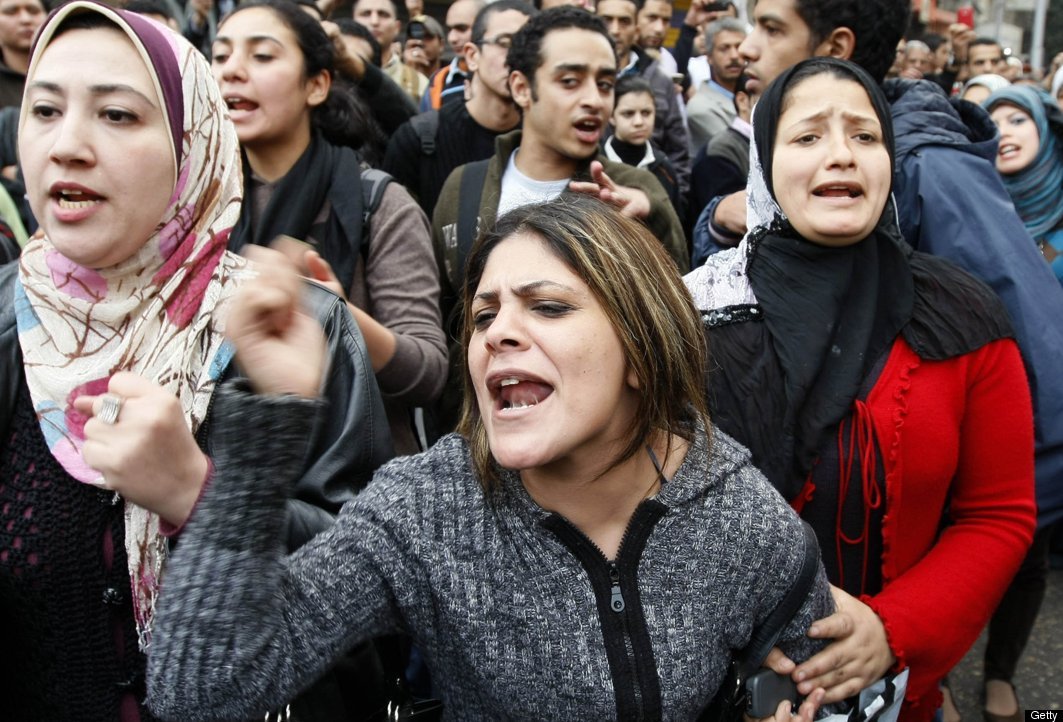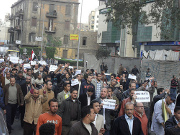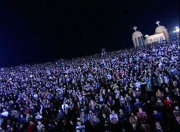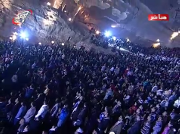 |
(Photo courtesy SAT 7) Prayer
meeting at the Cave Church. |
Egypt(MNN) ― There are a lot of headlines proclaiming the fury of Tahrir Square, set in the heart of downtown Cairo.
"Revolution" is on people's lips, but a new word is joining that plea for the freedom of Tahrir, and that is "Revival."
On our first night in Cairo, we met with a Coptic Church partner in the basement of a ministry facility where he'd just wrapped up some teaching. His first answer to our questions about the riots was: "The barrier of fear has been demolished."
That's quite a different assessment of what's going on from the lips of others. There's word that people are angry over their revolution being stolen by the Islamists; people are full of despair because the city is still in chaos. Many of the images we see about Cairo right now are full of despair, fear and defiance.
Yet, this church leader insists there is something significant on the wing. Through a translator, he announced, "There is a big revival happening in the Orthodox Church -- not only in the Orthodox Church, but in all of the Egyptian Church."
That seems to run counter to other reports of a mass exodus of Egyptian Christians seeking asylum anywhere that seems safer. He answered that question with this hope: "The Lord is using the people, the congregation, more than the leaders in this revival."
The movement began to coalesce two years ago when a call to unity started to resonate across denominational lines. "The start of this revival was a prayer meeting where the people gathered together to pray seeking this revival. People from different churches gathered together to pray together."
Then, he says, in late 2010, "Just before the Revolution, God was telling us that something awesome was going to happen in Egypt. Although we are in different areas as leaders in the church, the Lord was sending the same message to everybody."
That message was this: "By the end of 2010, something great will happen." That was based off of Jeremiah 46 and Daniel 7 and a promise from God to allow Christians to take over the land. Indeed, God fulfilled that prophecy, but not in the way you might think.
In the first 20 minutes of 2011, a suicide bomber attacked The Saint's Church in Alexandria. At least 21 people were killed and 70 hurt. Then, "Sometime later, the 25th of January, the Revolution started. We saw the incidents happening, but we were telling ourselves that something spiritual was going to happen…a big spiritual event."
As the events unfolded, the church leaders who had given themselves to prayer, unity and revival began to teach confidently. Their boldness was picked up by the congregations who then began to take prayer much more seriously.
That led to a prayer meeting. At a time of emergency, this church leader says, "About 50,000 people gathered together in the (Cave) church to pray for 12 hours."
Revival began to be the cry of their hearts. This Coptic Gospel partner along with others who were of like mind since the movement began two years ago also spent time teaching about the elements of revival to their congregations, emphasizing repentance, unity, humility, understanding, and a return to the authority of the Bible, among other things.
He also shared that he believes the change that will bring true liberty to Egypt won't come from the political side of things. It will come from the spiritual revolution.
Healing has begun in the freedom in Christ among Christians. It gives them the strength they need to persevere, because, as this pastor goes on to say, there are still a lot of obstacles to overcome. "There were many things against the church itself. Churches were being burnt, but the Lord has poured in an overflow of love. The outward thing that happened was that people, although they felt threatened by others, they went in and joined and started giving love to others. They even participated in Tahrir Square during the Revolution."
The story of Tahrir, or Freedom in Egypt, is ongoing. But, says this follower of Christ, it's not for Egypt alone. He's hoping Egypt will lead a global movement by her example. "I believe what happens here is transferring Egypt to the outside world."
